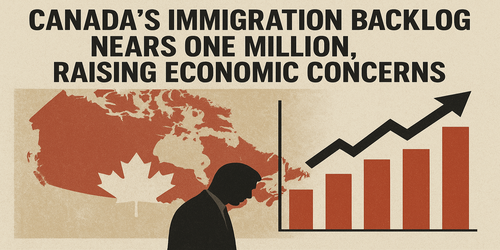Canada’s immigration system is facing immense pressure as number of pending applications approached one million. According to new data from Immigration, Refugees, and Citizenship Canada (IRCC), the applications backlog reached 958,850 applications as of August 31, 2025—an increase of more than 57,000 cases in just one month.
Permanent and Temporary Residency Applications Drive the Increase
The bulk of the backlog comes from permanent residency (PR) and temporary residency applications, which together make up nearly 95% of all delayed applications.
- Permanent Residency (PR): The PR backlog rose to 470,300 applications, up 26,800 in a single month. Only 47.9% of these files are being processed within standard timelines, down from 53.6% in June. We can see the effect on processing inside Canada applications for e.g. Atlantic Immigration Program (AIP) which is used to be processed around 6 months now taking more than a year.
- Temporary Residency: Applications for study, work, and visitor permits grew by 27,900 applications, bringing the total to 437,300 pending application. This increase highlights ongoing delays, even as overall intake volumes show minor fluctuations. There are many PGWP applicants who are waiting for more than 10 months and similarly several applicants waiting from months on study permit extension applications.
Citizenship Applications Remain More Stable
In contrast to permanent residency and temporary resident applications Citizenship applications are under control. As of the end of August, 51,200 applications remained in the queue—just 4.2% of the overall monthly increase. Processing efficiency is strong as 80.30% applications handled within service standards, close to matching the IRCC target of 80%.
Implications of The Delay On The Applicants
Immigration plays crucial role in the growth of Canada’s labor market and population growth. New comers represent 23% of the population and around 29% of the workforce. Due to uncontrolled processing delays put intense pressure on them leading to decreased productivity and delayed family reunification.
There are many PGWP applicants who were not able to secure job offers as they did not have the work permits on time. Many international students missed the intake as their study permit applications were pending. This resulted opportunities lost and extended time period to complete the education.




